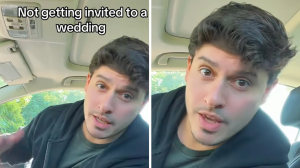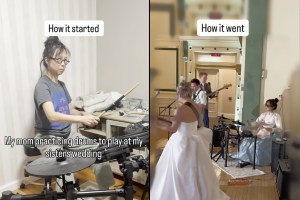Taylor Delk just started college in Atlanta, and she can’t wait to get into dating for the first time.
However, she has one major concern: when and how should she tell the boys she likes that she has a serious disease?
Taylor has sickle cell disease — a genetic disorder that affects the health of red blood cells and can cause extreme pain, tissue damage, impaired fertility, strokes, and even early death. She has type SS, which occurs when you inherit copies of the hemoglobin S gene from both parents. It’s the most common form of the disease and also the hardest on the body. It means she can experience the worst symptoms like regular fatigue, joint pain, anemia and infections at a higher rate.
But perhaps the hardest aspect of her disease is that you can’t tell she has it just by looking at her.
“It’s always hard to open up to people [about the disease] at first,” Taylor says. “Sometimes I would feel embarrassed, because it’s not normal, really.”
While she’s always had sickle cell disease, that doesn’t make talking about it any easier.
As a young kid, she got very sick all the time, which often required regular trips to the Aflac Cancer and Blood Disorders Center of Children’s Healthcare of Atlanta. A couple of times she even had acute chest syndrome, which is a severe side effect of sickle cell disease that causes intense chest pain and can be life-threatening.
Needless to say, she missed a lot of school.
She was usually open with her close friends about her condition, but other kids at school would occasionally question her about her illness because they couldn’t see any evidence of it.
“I remember when I was younger, my peers would be like, ‘Well you don’t look sick,’” Taylor recalls.
She’d find herself having to say things like, “I’m not sick right now, but, you know, I am. My body is not the same as yours.”
For example, she can experience pain spikes that start at a 4 on the pain scale and suddenly jump to a 9, but they don’t always show on her face.
The disease ramped up during her adolescence, likely because her body was growing and changing rapidly. However, once she reached her senior year, her symptoms began to mellow out. But that doesn’t mean she can’t still have a pain crisis anytime anywhere.
She’s learned to cope with the effects because of her amazing support system, starring her mom.
“My mom never leaves the hospital,” Taylor says. “She never leaves me by myself.” Her extended family also checks in with her on the regular and even stays to help out for days at a time during Taylor’s more severe episodes.
Her mom also constantly encourages her to talk candidly about her disease, which should help her as she makes her way through college.
“My mom made me tell people,” Taylor recalls. “I think she wanted me to be comfortable with myself.”
The encouragement seems to have helped. Taylor now finds it much easier to be open about it, even with people she doesn’t know as well. She realizes people need to know in case she finds herself in a crisis without her family nearby.
They also need to know so that future generations of people with sickle cell disease don’t feel like they have to hide it.
Even though her symptoms have settled, Taylor’s still talking about sickle cell disease, not just for herself, but for everyone.
Especially her little sister, who also has sickle cell disease.
Taylor’s sister Trinity is 11 years old and has the same type of sickle cell disease Taylor has, but so far, her case seems to be less severe. However, that hasn’t stopped Taylor from being a good big sister — aka pestering Trinity to take care of herself.
She constantly tells Trinity to drink water and gives her tips for coping with pain crises, like take a walk, use heat pads, listen to music, and talk to someone to distract yourself.
And most importantly, she encourages Trinity to be open about her disease so she grows up without any shame.
Now that Taylor’s on the precipice of a new adventure, she plans to live life to the fullest, sickle cell disease be damned.
Yes, that means making new friends and meeting boys, but it also means starting out on a path towards an exciting career. She’s taking pre-law classes and plans to become a lawyer, which is not a stress-free field. And even though stress has been known to exacerbate symptoms, Taylor’s not shying away from her dream.
She’s also trying not to shy away from talking about her disease with new people. She knows the more who understand it, the less alone people who have it will feel. Caregivers at the Aflac Cancer and Blood Disorders Center know that too, which is why they offer counseling and support groups for children living with sickle cell disease as well as their parents.
And who knows, that candidness could lead to an amazing new relationship.
To learn more about sickle cell disease or the Aflac Cancer and Blood Disorders Center, visit choa.org/fightsicklecell.


































